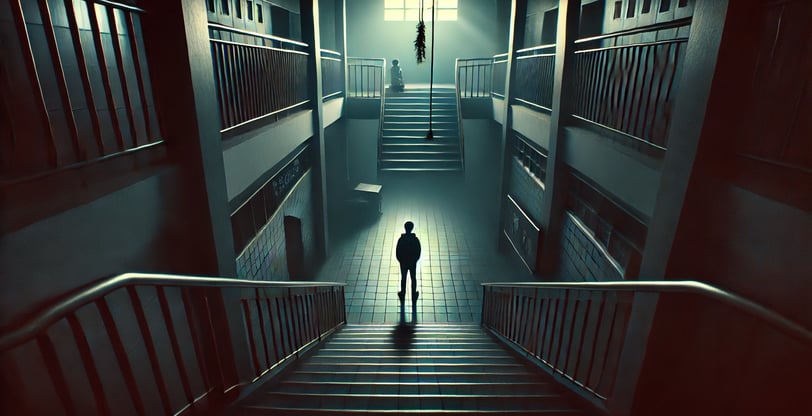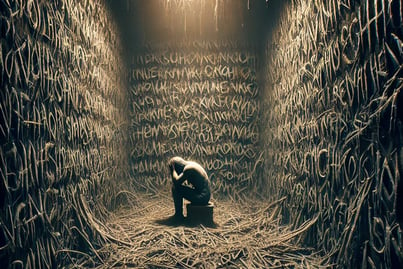Episode 3: When the Walls Start Screaming
Memory is a deceptive thing—twisting reality, burying guilt, distorting the truth. But what happens when the walls of the mind crack, and the past starts screaming? Monroe isn’t asking questions anymore—he’s forcing the truth out. A battered notebook. A haunting confession. A memory long suppressed. Did they ever stop it? Or did they just turn away?
STORY 2: ECHOES BENEATH THE SILENCE


Our grey cells can be deceptive little bastards.
Human memory, which we so religiously rely on, shapes itself from fragments of real experiences, stories, and figments of vivid imagination. We remember events that never happened simply because they were described to us, while unconsciously burying life's tragedies for self-preservation.
Does self-preservation take precedence over the truth? I wondered.
Monroe watches me like a hawk.
“I don’t have all day,” he says, almost bored. “You and I both know we’re not leaving this room until we get somewhere.”
I exhale sharply, leaning back in the chair. “We’re not getting anywhere because you’re playing mind games, not asking real questions.”
Monroe smirks like he’s amused by my resistance. “Oh, I’m asking real questions.
You just don’t like the answers.”
I open my mouth, ready to fire back, but he’s already reaching into a manila folder.
Slowly, deliberately, he pulls out a small, battered notebook and sets it between us.
I stare at it. The cover is faded, the corners frayed, and yet it looks familiar in a way I don’t want to acknowledge.
Monroe taps a finger against it. “This was Elijah’s.”
My stomach lurches.
“He wrote a lot in here,” Monroe continues. “Not the kind of things he’d say out loud. But things he thought. Things he felt. Things he lived through.” He flips it open, skimming the pages. “You know what’s interesting? A lot of what he wrote—it wasn’t just about what people did to him. It was about what people didn’t do.”
Monroe turns a page. His eyes skim over the words before he reads them aloud.
“I thought maybe they’d say something. But they never did.”
I press my palms harder into my lap, feeling my nails dig into my skin, but it’s not enough to ground me.
Monroe keeps reading.
“They laughed sometimes. Other times, they just stood there. Like I was something they could walk around. Like I wasn’t even there at all.”
The air in the room warps, shifts. My vision tunnels. A memory stirs.
Elijah. Hunched shoulders, clutching his backpack.
A hallway. A voice—mine? Someone else’s?—mocking him.
A shove. A laugh. Someone walking away.
My breath comes fast now, ragged. My fingers twitch, itching to grab something, push something, stop something.
No. No, this isn’t—it wasn’t like that.
I shove back against the memory, against the way it slithers into my head, but Monroe’s voice cuts through it, slicing clean.
“You were there, weren’t you?”
I snap.
The chair screeches as I push back violently, shoving away from the table. My hands slam against the metal, rattling the notebook.
“This is bullshit!” My voice is sharp, too sharp, but I don’t care. “You think reading words off a page makes this real? You think you can sit there and tell me what I did? What I didn’t do?”
Monroe doesn’t move, doesn’t flinch. His gaze stays locked on mine, steady.
Waiting. Watching. Letting me fall apart.
I rake a hand through my hair, pacing the short space between the table and the door. I want out. I need out. But there’s nowhere to go. Nowhere to hide.
“I didn’t—I didn’t do anything,” I say, but it sounds weak now, like I don’t even believe it myself. “I wasn’t like them. I wasn’t the one—”
Monroe doesn’t let me finish.
“Did you ever say anything?” His voice is quiet now. Dangerous. “Did you ever tell them to stop?”
The words strike something raw inside me. My breath catches.
Did I? I must have!
I can’t remember. Or maybe I don’t want to.
Monroe reaches for the notebook again, flipping a few more pages. His fingers slide down the worn paper, stopping near the bottom. He reads one final entry.
“They won’t remember me. They’ll forget my name. Or maybe they’ll remember, but only when it’s too late.”
My knees feel unsteady. The floor isn’t moving, but it feels like it is. I squeeze my eyes shut, but the words are still there, burned into the back of my mind, clawing at me.
I grip the edge of the table and shove it forward. The force sends Monroe’s notebook skidding across the metal.
Monroe pauses for a minute. Then he leans forward slightly, his eyes pinning me in place.
“You can be angry. You can flip tables, curse me out, punch a wall for all I care.” His voice is calm, unaffected. Unshakable. “But that doesn’t change one thing.”
He taps a finger against the table, slow, deliberate.
“You didn’t stop it.”
I can’t breathe.
The room isn’t small, but it feels like a coffin.
Another memory flashes. Elijah walking past me. His eyes finding mine. A silent question in them. Pleading? And me—turning away.
I swallow hard, but my throat is too dry. My vision blurs at the edges. I need this to stop.
Monroe watches. He knows I’m at the edge.
Then, finally, he leans back, folds his arms across his chest. His voice is lower now, almost… pitying.
“When did you forget, huh?” He tilts his head. “Or did you ever really forget at all?”
Something inside me fractures.
I feel the walls my mind put up to shield me breaking down.
I close my eyes—
And the floodgates open.




